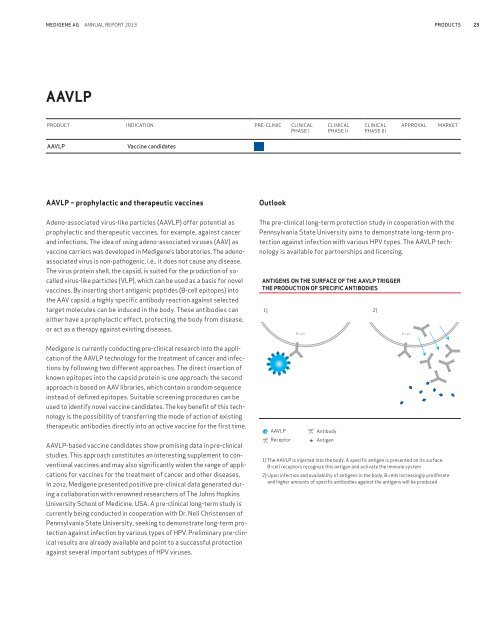mdg-annual-report-2013
mdg-annual-report-2013
mdg-annual-report-2013
You also want an ePaper? Increase the reach of your titles
YUMPU automatically turns print PDFs into web optimized ePapers that Google loves.
B-ZelleB-ZelleB-ZelleB-ZelleMedigene AG Annual <strong>report</strong> <strong>2013</strong> products 23AAVLPProduct Indication Pre-clinic ClinicalPhase IClinicalPhase IIClinicalPhase IIIApprovalMarketAAVLPVaccine candidatesAAVLP – prophylactic and therapeutic vaccinesOutlookAdeno-associated virus-like particles (AAVLP) offer potential asprophylactic and therapeutic vaccines, for example, against cancerand infections. The idea of using adeno-associated viruses (AAV) asvaccine carriers was developed in Medigene’s laboratories. The adenoassociatedvirus is non-pathogenic, i.e., it does not cause any disease.The virus protein shell, the capsid, is suited for the production of socalledvirus-like particles (VLP), which can be used as a basis for novelvaccines. By inserting short antigenic peptides (B-cell epitopes) intothe AAV capsid, a highly specific antibody reaction against selectedtarget molecules can be induced in the body. These antibodies caneither have a prophylactic effect, protecting the body from disease,or act as a therapy against existing diseases.The pre-clinical long-term protection study in cooperation with thePennsylvania State University aims to demonstrate long-term protectionagainst infection with various HPV types. The AAVLP technologyis available for partnerships and licensing.Antigens on the surface of the AAVLP triggerthe production of specific antibodiesB-Zelle B-ZelleB-Zelle B-Zelle1) 2)B-cell B-cellB-cell B-cellMedigene is currently conducting pre-clinical research into the applicationof the AAVLP technology for the treatment of cancer and infectionsby following two different approaches. The direct insertion ofknown epitopes into the capsid protein is one approach; the secondapproach is based on AAV libraries, which contain a random sequenceinstead of defined epitopes. Suitable screening procedures can beused to identify novel vaccine candidates. The key benefit of this technologyis the possibility of transferring the mode of action of existingtherapeutic antibodies directly into an active vaccine for the first time.aaVLPantibodyAAVLP-based vaccine candidates show promising data in pre-clinicalstudies. This approach constitutes an interesting supplement to conventionalvaccines and may also significantly widen the range of applicationsfor vaccines for the treatment of cancer and other diseases.In 2012, Medigene presented positive pre-clinical data generated duringa collaboration with renowned researchers of The Johns HopkinsUniversity School of Medicine, USA. A pre-clinical long-term study iscurrently being conducted in cooperation with Dr. Neil Christensen ofPennsylvania State University, seeking to demonstrate long-term protectionagainst infection by various types of HPV. Preliminary pre-clinicalresults are already available and point to a successful protectionagainst several important subtypes of HPV viruses.receptorantigen1) The AAVLP is injected into the body. A specific antigen is presented on its surface.B-cell receptors recognize this antigen and activate the immune system2) Upon infection and availability of antigens in the body, B cells increasingly proliferateand higher amounts of specific antibodies against the antigens will be produced


